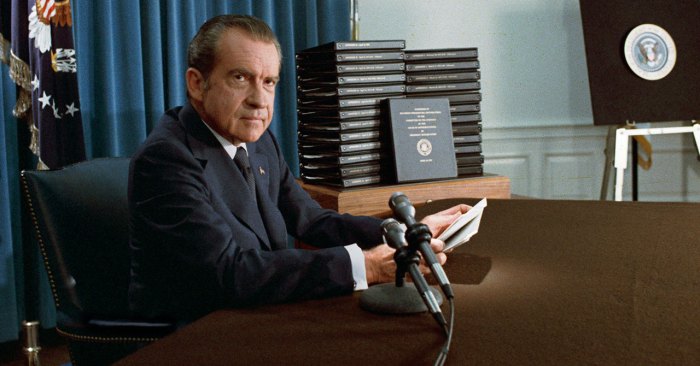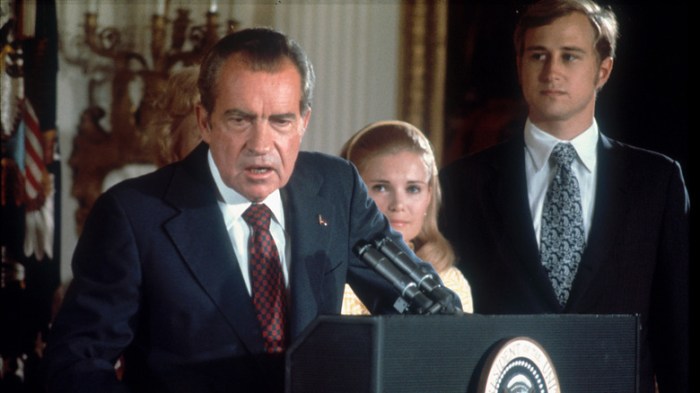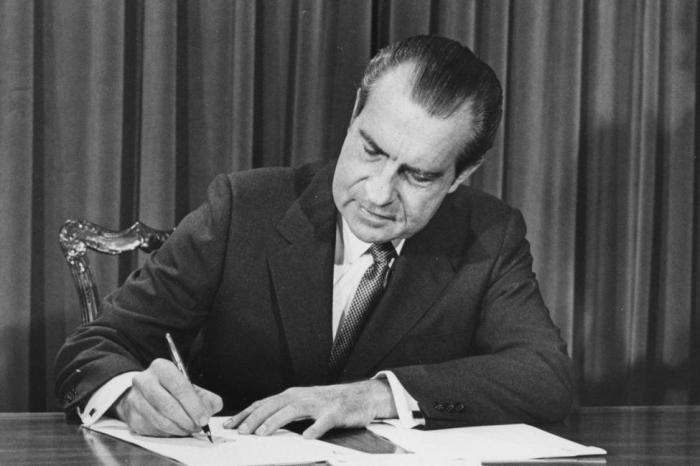What are the most convincing reasons for prosecuting Nixon? This question has been debated by historians and legal scholars for decades. Nixon’s actions during the Watergate scandal, his obstruction of justice, and his abuse of power all provide compelling reasons for prosecuting him.
However, the importance of public trust in a democracy and the impact of Nixon’s resignation on the restoration of that trust must also be considered.
The Watergate scandal was a major political scandal that occurred in the United States during the 1970s. The scandal involved the break-in of the Democratic National Committee headquarters at the Watergate office complex in Washington, D.C., and the subsequent cover-up of the incident by the Nixon administration.
Nixon’s involvement in the scandal led to his resignation from office in 1974.
Watergate Scandal

The Watergate scandal was a political scandal that occurred in the United States during the presidency of Richard Nixon. The scandal began with the break-in of the Democratic National Committee headquarters at the Watergate Office Building in Washington, D.C., on June 17, 1972. The break-in was carried out by operatives working for Nixon’s re-election campaign.
The scandal escalated as Nixon and his administration attempted to cover up their involvement in the break-in and the subsequent investigation.
The Watergate scandal had a profound impact on Nixon’s presidency. The scandal led to the resignation of Nixon in August 1974, and the indictment and conviction of several of his top aides. The scandal also led to a loss of confidence in the government and a decline in Nixon’s popularity.
Break-in
The Watergate break-in was carried out by five men who were working for Nixon’s re-election campaign. The men broke into the Democratic National Committee headquarters in the Watergate Office Building and stole documents and bugged the phones.
Cover-up
After the break-in, Nixon and his administration attempted to cover up their involvement. Nixon ordered the CIA to block the FBI’s investigation of the break-in. He also ordered his aides to lie to investigators and destroy evidence.
Investigation
The Watergate scandal was investigated by the Senate Select Committee on Presidential Campaign Activities, the House Judiciary Committee, and the Watergate Special Prosecution Force. The investigations revealed Nixon’s involvement in the cover-up and led to his resignation.
Role of the Media
The media played a crucial role in uncovering the Watergate scandal. The Washington Post, in particular, published a series of articles that exposed Nixon’s involvement in the cover-up. The media’s coverage of the scandal helped to turn public opinion against Nixon and led to his resignation.
Role of Public Opinion, What are the most convincing reasons for prosecuting nixon
Public opinion played a major role in the outcome of the Watergate scandal. The public’s outrage over Nixon’s involvement in the cover-up led to a loss of confidence in his presidency. This loss of confidence eventually forced Nixon to resign.
Obstruction of Justice

Obstruction of justice is a crime that occurs when someone interferes with a legal investigation or proceeding. Nixon was accused of obstruction of justice for his role in the Watergate cover-up.
There is evidence that Nixon was involved in the obstruction of justice. For example, Nixon ordered the CIA to block the FBI’s investigation of the Watergate break-in. He also ordered his aides to lie to investigators and destroy evidence.
The obstruction of justice charges against Nixon were serious. If he had been convicted, he could have been sentenced to prison.
Legal Implications
The obstruction of justice charges against Nixon had serious legal implications. If he had been convicted, he could have been sentenced to prison. The charges also could have led to Nixon’s disbarment from practicing law.
Ethical Implications
The obstruction of justice charges against Nixon also had serious ethical implications. Nixon’s actions violated the public trust and undermined the rule of law. His actions also set a dangerous precedent for future presidents.
Abuse of Power

Abuse of power is a crime that occurs when a public official uses their position for personal gain or to harm others. Nixon was accused of abuse of power for his use of the IRS and FBI to target his political opponents.
There is evidence that Nixon abused his power. For example, Nixon ordered the IRS to audit the tax returns of his political opponents. He also ordered the FBI to investigate his political opponents.
The abuse of power charges against Nixon were serious. If he had been convicted, he could have been sentenced to prison.
Potential Consequences
The abuse of power charges against Nixon had serious potential consequences. If he had been convicted, he could have been sentenced to prison. The charges also could have led to Nixon’s impeachment.
Rule of Law
Nixon’s abuse of power also undermined the rule of law. The rule of law is the principle that everyone is subject to the law, regardless of their position or power. Nixon’s actions violated this principle and set a dangerous precedent for future presidents.
Balance of Power
Nixon’s abuse of power also upset the balance of power between the different branches of government. The Constitution gives Congress the power to investigate the president and to impeach the president if necessary. Nixon’s actions weakened Congress’s ability to hold the president accountable.
Public Trust: What Are The Most Convincing Reasons For Prosecuting Nixon

Public trust is essential for a democracy to function properly. The public must trust that their government is acting in their best interests. Nixon’s actions eroded public trust in the government.
Nixon’s lies and cover-ups made the public question whether they could trust their government. His actions also made the public question whether the government was working for them or for the president.
Nixon’s resignation helped to restore some public trust in the government. However, the Watergate scandal had a lasting impact on the public’s trust in government.
Impact of Nixon’s Resignation
Nixon’s resignation helped to restore some public trust in the government. It showed that no one is above the law, not even the president. Nixon’s resignation also showed that the government is responsive to the will of the people.
Answers to Common Questions
Why was Nixon not prosecuted?
Nixon was not prosecuted in order to avoid further division in the country.
What were the consequences of Nixon’s actions?
Nixon’s actions led to his resignation from office and damaged public trust in the government.